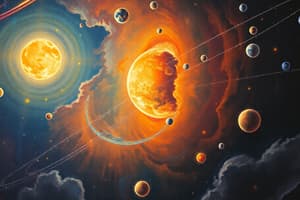Podcast
Questions and Answers
What is the most commonly recognized theory of the formation of the Solar System?
What is the most commonly recognized theory of the formation of the Solar System?
- Encounter Hypothesis
- Migration Idea
- Protoplanet Hypothesis
- Nebular Hypothesis (correct)
According to the Giant Impact Hypothesis, the collision between the proto-Earth and Theia resulted in the formation of the ____.
According to the Giant Impact Hypothesis, the collision between the proto-Earth and Theia resulted in the formation of the ____.
Moon
The Moon's composition is different from Earth, containing a higher amount of iron.
The Moon's composition is different from Earth, containing a higher amount of iron.
False (B)
What are comets made of?
What are comets made of?
Who proposed the Asteroid Belt Formation Theory?
Who proposed the Asteroid Belt Formation Theory?
Flashcards are hidden until you start studying
Study Notes
Scientific Theories on Formation of the Solar System
Nebular Hypothesis (Modern Nebular Theory)
- Massive molecular cloud collapsed under gravity to form the solar system around 4.6 billion years ago
- Sun originated at the center of the collapsing mass, with the remaining mass flattening into a protoplanetary disc
- Planets, moons, and other objects formed from this disc through accretion
- Angular momentum played a crucial role in forming the disc
- Disc temperature variations impacted planet makeup
- The "frost line" divides the development of rocky and gaseous planets
Theories on Formation of the Planets
- Modern Nebular Theory: solar nebula collapsed to form the Sun and planets
- Rocky materials formed terrestrial planets (Mercury, Venus, Earth, and Mars) near the Sun
- Gas giants (Jupiter and Saturn) formed further away from the Sun
- Alternative theories: encounter hypothesis, protoplanet hypothesis, and migration idea
Theory on Formation of the Moons (Giant Impact Hypothesis)
- Oblique collision between proto-Earth and Theia (a planetary body the size of Mars) around 4.5 billion years ago
- Impact launched debris into orbit, which gradually formed the Moon over weeks to years
- Moon's composition is iron-depleted, similar to Earth's mantle
- Supporting evidence: identical oxygen isotope ratios in rocks from Earth and Moon
Theory on Formation of Asteroids (Asteroid Belt Formation Theory)
- Asteroid belt was initially empty and formed from excess rocky material during the formation of terrestrial planets
- Material was gravitationally flung outward, implanting S-type (stony) asteroids into the inner main belt
- Gas giants' formation destabilized neighboring planetesimals, injecting C-type (carbon-rich) asteroids into the outer main belt
Theories on the Formation of Comets
- Comets likely formed in outer areas beyond the "frost line" around 4.6 billion years ago
- Comets come from the Kuiper Belt and Oort Cloud
- Comet composition: solid bodies made of ice, dust, and small rock fragments
- Comets are a mixture of water ice and other volatile substances that evaporate when approaching the Sun
Studying That Suits You
Use AI to generate personalized quizzes and flashcards to suit your learning preferences.




